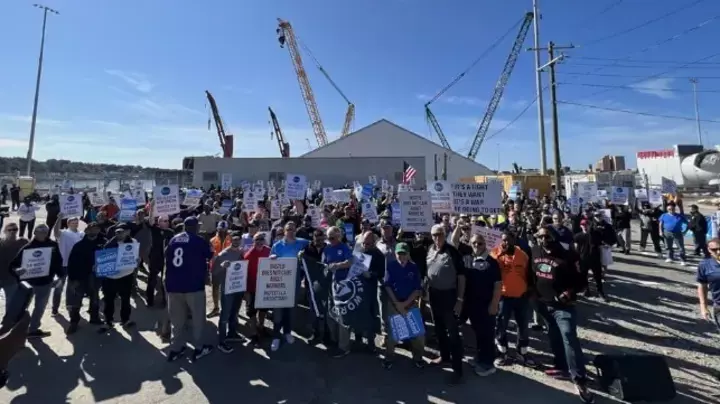ILA Union Credits President-Elect Donald Trump for Securing Landmark Labor Contract with Port Employers
Introduction
In a pivotal move for the maritime industry, the International Longshoremen’s Association (ILA) has acknowledged President-elect Donald Trump’s role in facilitating a landmark six-year master contract agreement with the US Maritime Alliance (USMX). This significant development not only averts a potential shutdown of East and Gulf Coast ports but also safeguards the livelihoods of 85,000 ILA members. This article explores the intricacies of the agreement, its ramifications for the maritime industry, and the broader environmental considerations.
The agreement was reached following a pivotal intervention by President-Elect Donald Trump during a December 12th meeting at Mar-a-Lago. ILA President Harold
J. Daggett, accompanied by Executive Vice President Dennis A. Daggett, engaged in a two-hour discussion with Trump to address the negotiation stalemate with USMX. Trump’s direct contact with USMX officials and public support on Truth Social were instrumental in breaking the impasse.
Key Aspects of the Agreement
The new contract establishes a framework for integrating new technologies, particularly automation—a longstanding point of contention within the maritime industry. Although the specific terms remain confidential pending ratification by both ILA members and USMX stakeholders, both parties have confirmed that the agreement ensures job security for ILA members while allowing for technological advancements.
Technical Parameters and Additional Data
- The agreement is a six-year master contract between the ILA and USMX.
- The contract secures the jobs of 85,000 ILA members.
- The agreement outlines a framework for implementing technologies, including automation.
- The contract was negotiated following a meeting between ILA leadership and President-Elect Donald Trump at Mar-a-Lago.
- The agreement is pending ratification by both ILA rank-and-file members and USMX stakeholders.
Impact on the Maritime Industry
The agreement holds substantial implications for the maritime industry, particularly in the realms of automation and job security. The ILA’s longstanding opposition to automation, driven by concerns over job losses and worker displacement, has been a significant hurdle. This new contract addresses these concerns by establishing a framework for technological integration while protecting jobs.
Moreover, the agreement underscores the importance of collaboration and negotiation in the maritime industry. The direct communication and intervention facilitated by President-Elect Donald Trump highlight the value of such approaches in resolving disputes and reaching mutually beneficial agreements.
Environmental Considerations
While the agreement does not explicitly address environmental issues, the implementation of new technologies, including automation, may have indirect environmental impacts. Enhanced efficiency and reduced labor costs could lead to increased trade volumes, potentially resulting in higher greenhouse gas emissions. However, the agreement also presents an opportunity for the maritime industry to invest in more sustainable technologies and practices, thereby reducing its environmental footprint.
Summary
The ILA’s landmark labor contract with port employers, facilitated by President-Elect Donald Trump, has far-reaching implications for the maritime industry. The agreement secures the jobs of 85,000 ILA members while establishing a framework for implementing technologies, including automation. Although the agreement does not directly address environmental concerns, it opens avenues for the industry to adopt more sustainable practices.
Conclusion
As the maritime industry continues to evolve, it is crucial to prioritize collaboration, negotiation, and sustainability. The recent agreement between the ILA and USMX serves as a testament to the power of effective communication and mutual respect in achieving beneficial outcomes. By embracing technological advancements while ensuring job security and environmental responsibility, the maritime industry can navigate towards a prosperous and sustainable future.
Industry stakeholders should take note of this development and strive to replicate such collaborative efforts in their own negotiations. By doing so, the maritime industry can not only secure its economic viability but also contribute positively to environmental sustainability.
List of Sources
- Union boss credits Trump for helping reach deal to avoid another port …
- ILA Credits Donald Trump with Successful Conclusion of East Coast Ports …
- ILA Union Gives Trump ‘Full Credit’ for Helping Secure Labor Contract …
- Dockworkers union hails Trump’s support in contract negotiations – The Hill
- ILA President Harold Daggett Credits President Donald J. Trump’s …
- Donald Trump Supports ILA Leadership in Fight Over Port Automation
- In Port Labor Dispute, Trump Backed a Union That Courted Him
- Trump again backs longshore union as possible port strike nears
- Trump backs dockworkers’ union in port automation dispute, transition …
- Trump backs dockworkers in port automation battle


Leave a Reply